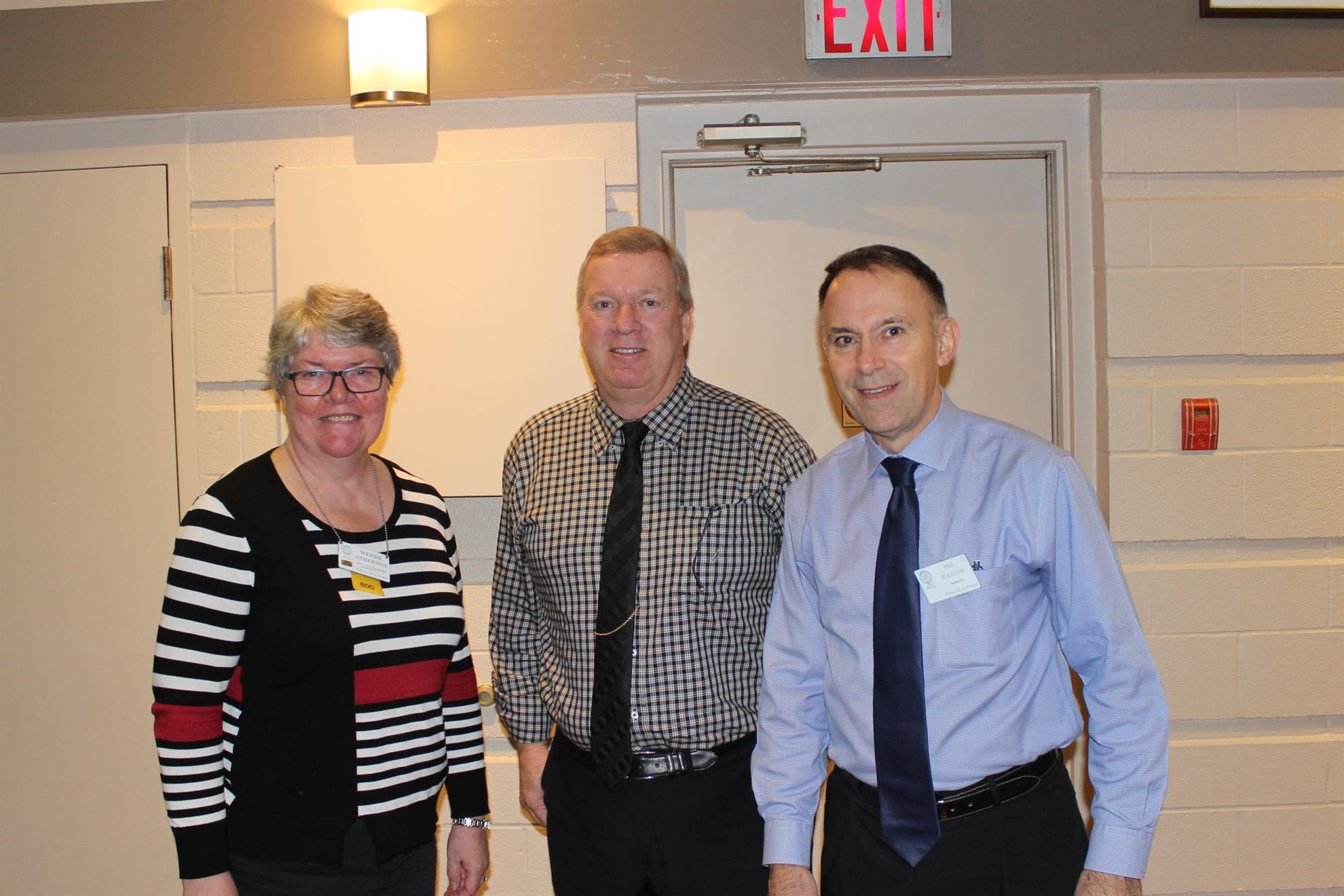March 07, 2019: Club Ownership.
Head Table: Our President Paul Roulston, invites, all major chairpesrsons, to join him at the head table.
Today at Rotary: Our speaker today was Henry Wydeven, member of the Dairy Farmers of Ontario Board representing Huron and Perth counties. Henry’s family dairy farm, now operated by his son and daughter-in-law, is located in Downie Township and Henry commutes there from his residence in St Marys when he is not busy with Board business.

Program speaker Henry Wydeven flanked by introducer Wendy Anderson and President Paul speaking on Dairy situation in Ontario.
Henry began with an overview of the significance of the dairy industry in Ontario and Perth County. Dairy farmers in Ontario produce 3 Billion litres of milk annually on 3500 dairy farms, supplying 72 processing plants in the province. Ontario farmers provide 850,000 litres free of charge to 180 food banks across the province each year. DFO supports programs for youth sports and provides nutritional education to school children across the province each year.
Perth County dairy farmers produce about 11% of the province’s milk supply. There are 325 dairy farms in Perth County that generate sales of about $260M annually.
The supply management system means that DFO buys all the raw milk in Ontario and sells it to processors who make it into the many dairy products that consumers enjoy. Milk quota allows the system to produce the quantity of milk that is required by the processors. Depending on the demand, DFO can increase or decrease the amount of quota held by individual farmers. The price that farmers receive for their milk is determined by the cost of production formula on an annual basis. The job of DFO is to ensure that farmers are treated fairly. All members of the Board must be dairy farmers under the Milk Act of 1965.
Henry highlighted several issues that are currently on the DFO radar –
Trade – This is a political issue. While DFO actively lobbies on behalf of its producers, there is no telling what impact they can have on trade talks. It is important to remember that whatever market share is given away, the impact will be felt throughout the local economy. So far, about 18% of the Canadian market share has been negotiated away, allowing subsidized foreign products into the country in place of the Canadian non-subsidized product. The next challenge will be the fallout from Brexit. It has been gratifying to see the support of Canadian consumers, which has increased consumption to date.
Food Guide - While there are many positives to the new Food Guide, including the focus on local, home-cooked food, DFO is disappointed that the new Food Guide did not following the science-based recommendations from Health Canada. For example, in promoting almond ‘beverage’, it does not take into account that 37 times more water is used to produce one litre of almond beverage than to produce one litre of milk.
Henry’s farm has been assessed for its carbon footprint – the cows do produce methane, but that methane production is offset by the crops that are grown on his farm, making his farm a carbon positive operation. That activity is not accounted for in the new Food Guide.
Consumer Concerns
The Pro-Action program has been developed to give consumers confidence in the dairy industry in Canada. The stringent standards for which dairy farmers are held accountable include:
-Canadian Quality Milk – to ensure only product of the highest quality reaches consumers
- Animal Care – standards of care for dairy animals
-Traceability – an ID system for individual animals in case of health concerns
- Bio Security – regulating farm-to-farm movement of animals to prevent disease transmission
-Environment – provides guidelines for farmers to operate in an environmentally safe way Inspections take place regularly. If standards are not met, individual farmers can and do lose their license to produce milk.
In conclusion, Henry stated that he enjoys his work on the Board because it is important to the future of family farms across the province.
Henry was introduced by Wendy Anderson and thanked by Norm Bird.
Scribe: Wendy Anderson
Rotary Announcements
Rural Urban Night – Thursday, April 18 at the Rotary Complex – Social at 6, Dinner at 7. Tickets will be available at regular Rotary meetings starting March 7. $35.00 each. Reserved seating available for tables of 8 or more.
Catch the Ace – the first draw of the new round will be held on March 16th. Volunteer opportunities available. Check Clubrunner, please.
Home and Leisure Show - April 12-14, Rotary Complex
Guests: Today we welcomed, Brian Anderson - Athlone Farms, Dennis Peters - Athlone Farms, Heather Peters - Athlone Farms, Myrna Inglis - Walkerton Rotary Club, Noah Runstedler - St Michael’s Secondary School, Jadelen Gerrie - St Michael’s Secondary School, Jacob Dekok - St Michael’s Secondary School
Draw: A gift box from Stonetown Cheese in St Marys, was donated by Wendy Anderson, won by John Wright.
Make-ups: No report.
March’s Attendance Committee: Sarah Hamza (I/C), Jim Scott, John Wright, Andrea Page, Chris Thomson, Al Wakelin, Jo-Anne Hood Tidman, Doug Brown.



